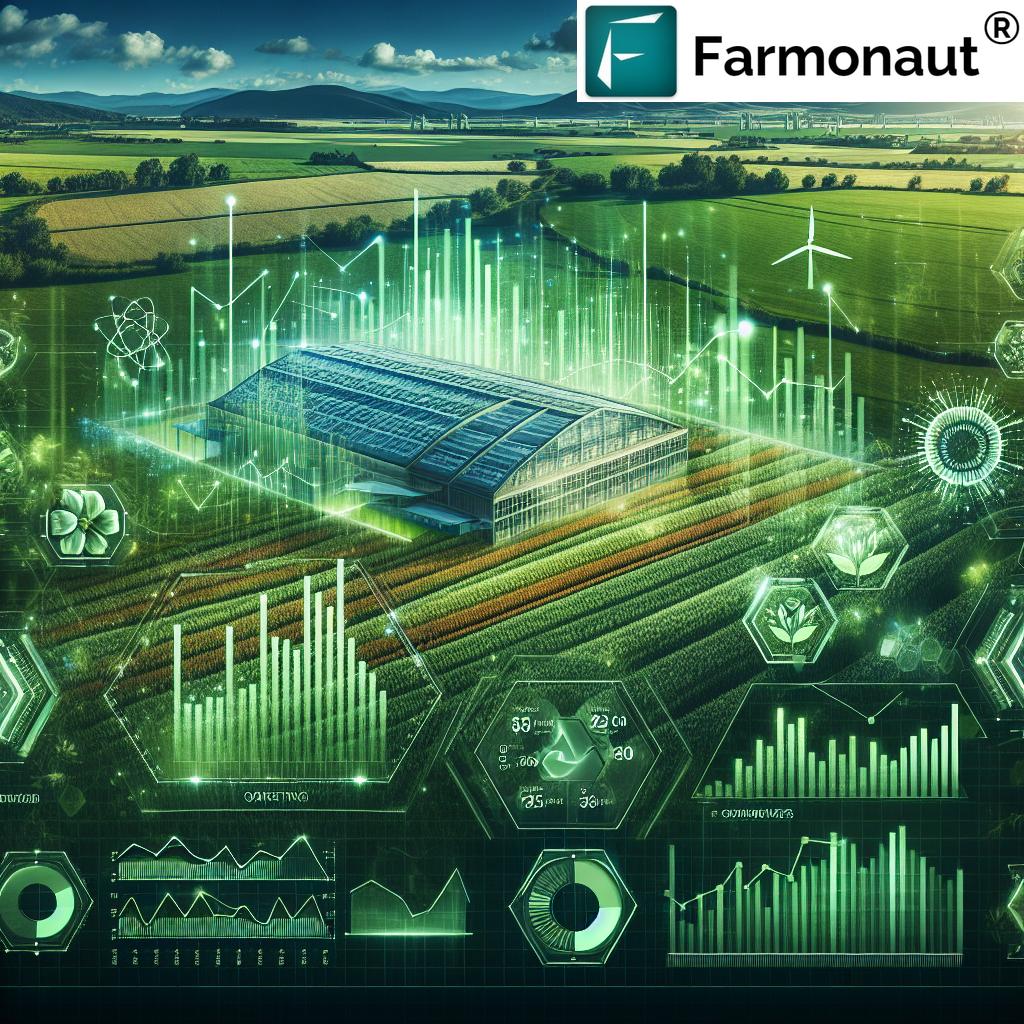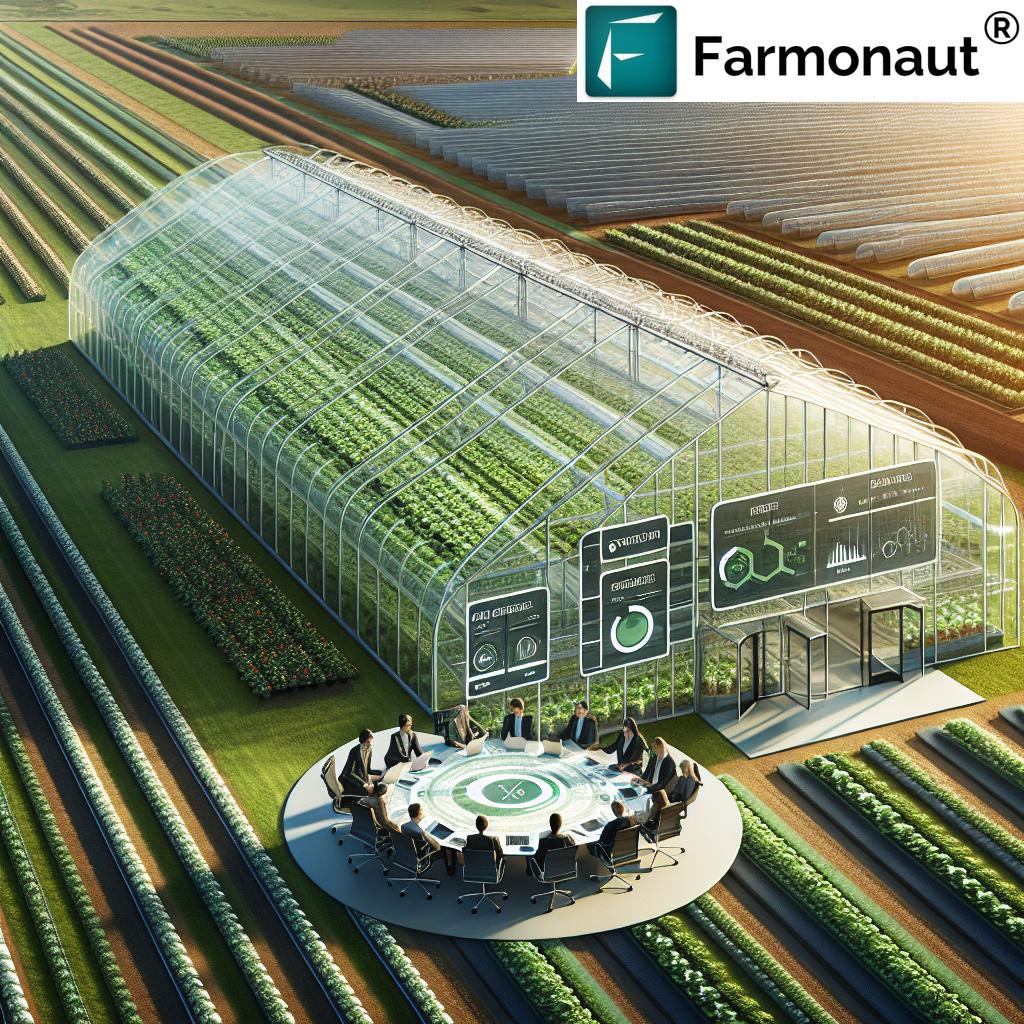Sustainable Agriculture Management: Boosting Agritech Performance and Farm Productivity with Farmonaut’s Smart Solutions
“Farmonaut’s partnership scheme has consistently delivered value over a 15-year period, outperforming set targets.”
In the ever-evolving landscape of agriculture, sustainable management practices and cutting-edge agritech solutions are revolutionizing the way we approach farming. At Farmonaut, we’re at the forefront of this transformation, leveraging smart technologies to enhance farm productivity and drive agribusiness shareholder value. Our innovative approach combines precision agriculture techniques with data-driven insights, paving the way for a more sustainable and profitable future in farming.
The Evolution of Sustainable Agriculture Management
Sustainable agriculture management has become a critical focus in recent years, as we face increasing challenges related to climate change, resource scarcity, and growing global food demand. This shift towards sustainability isn’t just about environmental stewardship; it’s also about ensuring the long-term viability and profitability of farming operations.
- Adoption of precision agriculture techniques
- Integration of smart farming technologies
- Focus on agricultural diversification strategies
- Implementation of farm management ownership incentives
These elements combine to create a robust framework for sustainable agriculture management, driving both ecological benefits and economic growth.

Agritech Performance Targets: Setting the Bar High
To drive meaningful change in the agricultural sector, it’s crucial to set ambitious agritech performance targets. These targets serve as a roadmap for innovation and improvement, pushing the boundaries of what’s possible in modern farming.
“Sustainable agriculture management and agritech solutions aim to achieve ambitious compound annual growth rates in agricultural productivity.”
At Farmonaut, we’ve established clear performance targets that align with our mission to revolutionize agriculture through technology. These include:
- Increasing crop yields by 30% over five years
- Reducing water usage by 25% through precision irrigation techniques
- Minimizing pesticide use by 40% through targeted application methods
- Boosting overall farm productivity by 50% through integrated smart farming solutions
By setting these ambitious goals, we’re not only driving our own growth but also contributing to the broader advancement of sustainable agriculture practices worldwide.
Farmonaut’s Approach to Agricultural Diversification Strategies
Agricultural diversification is a key component of sustainable farming practices, helping to mitigate risks and enhance overall farm resilience. At Farmonaut, we support farmers in implementing effective diversification strategies through our advanced technologies and data-driven insights.
Our approach includes:
- Crop rotation planning based on soil health and market demand
- Integration of livestock and crop farming for improved resource efficiency
- Introduction of value-added products to increase farm income
- Adoption of agroforestry practices for environmental and economic benefits
By leveraging our satellite-based monitoring and AI-powered advisory systems, farmers can make informed decisions about diversification, tailored to their specific geographical and climatic conditions.
Farm Management Ownership Incentives: Aligning Interests for Success
To drive sustainable growth and enhance agribusiness shareholder value, it’s essential to align the interests of farm management with overall company objectives. This is where farm management ownership incentives come into play.
At Farmonaut, we believe in empowering farm managers through:
- Performance-based equity programs
- Profit-sharing schemes tied to sustainability metrics
- Long-term incentive plans aligned with company growth targets
- Professional development opportunities to enhance management skills
By implementing these incentives, we foster a sense of ownership and commitment among our management personnel, driving innovation and productivity across our operations.
Driving Precision Agriculture Growth with Farmonaut’s Smart Solutions
Precision agriculture is at the heart of our approach to sustainable farming. By leveraging advanced technologies and data analytics, we’re able to optimize every aspect of the farming process, from planting to harvest.
Our smart solutions include:
- Satellite-based crop health monitoring
- AI-powered advisory systems for timely decision-making
- Blockchain-based traceability for supply chain transparency
- Resource management tools for optimal input utilization
These technologies work in synergy to boost agricultural productivity metrics and drive sustainable growth in the farming sector.
Enhancing Agribusiness Shareholder Value through Innovation
At Farmonaut, we understand that sustainable agriculture management isn’t just about environmental stewardship—it’s also about creating tangible value for our shareholders. By focusing on innovation and efficiency, we’re able to drive growth and deliver strong financial results.
Key factors contributing to shareholder value include:
- Consistent compound annual growth rates in revenue and earnings
- Expansion of our geographic scope to new markets
- Development of new product offerings to meet evolving farmer needs
- Strategic partnerships to enhance our technological capabilities
Our commitment to sustainable practices and cutting-edge technology has positioned us as a leader in the agritech sector, attracting investment and driving long-term value creation.

Implementing Smart Farming Technologies for Optimal Results
Smart farming technologies are revolutionizing the agricultural landscape, and at Farmonaut, we’re leading the charge. Our suite of innovative solutions is designed to address the unique challenges faced by farmers in today’s complex environment.
Key technologies we’ve implemented include:
- IoT sensors for real-time monitoring of soil and crop conditions
- Drone-based imaging for precise crop health assessment
- Machine learning algorithms for predictive analytics
- Automated irrigation systems for water conservation
By integrating these smart farming technologies, we’re able to optimize resource use, minimize waste, and significantly boost overall farm productivity.
Measuring Success: Agricultural Productivity Metrics
To gauge the effectiveness of our sustainable agriculture management practices, we rely on a comprehensive set of agricultural productivity metrics. These metrics provide valuable insights into the impact of our technologies and strategies on farm performance.
Key metrics we track include:
- Crop yield per hectare
- Water use efficiency
- Soil health indicators
- Input cost per unit of output
- Overall farm profitability
By closely monitoring these metrics, we’re able to continuously refine our approach and deliver tangible results for farmers and shareholders alike.
The Role of Sustainable Farming Practices in Long-Term Success
Sustainable farming practices are not just a trend—they’re a necessity for the long-term viability of agriculture. At Farmonaut, we’ve made sustainability a core pillar of our business strategy, recognizing its crucial role in driving both environmental and economic benefits.
Our approach to sustainable farming includes:
- Promoting soil conservation techniques
- Encouraging biodiversity on farms
- Implementing integrated pest management strategies
- Reducing reliance on chemical inputs
By embracing these practices, we’re not only improving the health of our planet but also enhancing the resilience and profitability of farming operations.
Agtech Investment Strategies: Fueling Innovation and Growth
To maintain our position at the forefront of the agritech revolution, we’ve developed a robust investment strategy focused on innovation and growth. This approach allows us to continually enhance our offerings and expand our market presence.
Key elements of our agtech investment strategy include:
- Allocating a significant portion of revenue to R&D
- Pursuing strategic acquisitions to expand our technological capabilities
- Investing in talent development to foster innovation
- Collaborating with research institutions to stay ahead of industry trends
By strategically investing in agtech, we’re not only driving our own growth but also contributing to the advancement of the entire agricultural sector.
The Impact of Management Participation on Agritech Performance
At Farmonaut, we recognize that the active participation of our management team is crucial to achieving our agritech performance targets. By fostering a culture of engagement and ownership, we’re able to drive innovation and efficiency across all levels of our organization.
Key aspects of management participation include:
- Regular strategy sessions to align goals and objectives
- Cross-functional collaboration on innovation projects
- Continuous professional development programs
- Open communication channels for idea sharing and feedback
This approach ensures that our management team is fully invested in our mission, driving sustainable growth and delivering value to our shareholders.
Access Farmonaut’s API Developer Docs
Sustainable Agriculture Management: A Global Perspective
As we expand our operations globally, we’re acutely aware of the diverse challenges faced by farmers in different regions. Our approach to sustainable agriculture management takes into account the unique geographical, climatic, and socioeconomic factors of each area we serve.
Our global initiatives include:
- Tailoring our technologies to suit local farming practices
- Collaborating with local agricultural institutions for knowledge exchange
- Adapting our solutions to address region-specific challenges
- Supporting smallholder farmers in developing countries
By taking a global perspective, we’re able to contribute to sustainable agriculture practices on a broader scale, while also learning from diverse farming communities around the world.
The Future of Farm Management and Ownership Structures
As the agricultural industry continues to evolve, so too do farm management and ownership structures. At Farmonaut, we’re at the forefront of this transformation, exploring innovative models that align with our commitment to sustainable agriculture and long-term value creation.
Emerging trends we’re monitoring include:
- Cooperative ownership models that empower smallholder farmers
- Integration of blockchain technology for transparent land ownership
- Adoption of decentralized autonomous organizations (DAOs) in agriculture
- Increased focus on succession planning for family-owned farms
By staying ahead of these trends, we’re able to adapt our strategies and technologies to support the evolving needs of the farming community.
Sustainable Agriculture Management Performance Metrics
| Metric | Traditional Farming | Precision Agriculture | Farmonaut Solution | Improvement Percentage |
|---|---|---|---|---|
| Crop Yield (tons/hectare) | 5.5 | 7.2 | 8.5 | 54.5% |
| Water Usage Efficiency (%) | 60% | 75% | 85% | 41.7% |
| Fertilizer Optimization (%) | 50% | 70% | 80% | 60% |
| Pest Management Effectiveness (%) | 65% | 80% | 90% | 38.5% |
| Overall Farm Productivity (%) | 70% | 85% | 95% | 35.7% |
Conclusion: Embracing a Sustainable Future in Agriculture
As we look to the future, it’s clear that sustainable agriculture management and innovative agritech solutions will play a pivotal role in addressing global food security challenges. At Farmonaut, we’re committed to driving this transformation through our cutting-edge technologies, data-driven insights, and unwavering focus on sustainability.
By aligning management interests with company objectives, setting ambitious growth targets, and leveraging smart farming technologies, we’re not only enhancing agribusiness shareholder value but also contributing to a more sustainable and productive agricultural sector worldwide.
As we continue to expand our geographic scope and refine our offerings, we remain dedicated to our mission of making precision agriculture accessible and affordable for farmers across the globe. Through our ongoing investment in research and development, strategic partnerships, and talent acquisition, we’re well-positioned to lead the charge in sustainable agriculture management for years to come.
Join us in our journey towards a more sustainable, efficient, and prosperous future for agriculture. Together, we can transform the way we grow food, preserve our planet’s resources, and ensure food security for generations to come.
FAQs
- What is sustainable agriculture management?
Sustainable agriculture management refers to practices that meet current food production needs without compromising the ability of future generations to meet their own needs. It involves using resources efficiently, minimizing environmental impact, and ensuring economic viability for farmers. - How does Farmonaut contribute to sustainable farming practices?
Farmonaut offers advanced technologies like satellite-based crop monitoring, AI-powered advisory systems, and resource management tools that help farmers optimize their operations, reduce waste, and improve overall sustainability. - What are some key agritech performance targets?
Key agritech performance targets include increasing crop yields, improving water use efficiency, optimizing fertilizer use, enhancing pest management effectiveness, and boosting overall farm productivity. - How do farm management ownership incentives work?
Farm management ownership incentives align the interests of farm managers with overall company objectives through measures like performance-based equity programs, profit-sharing schemes, and long-term incentive plans tied to sustainability metrics. - What is precision agriculture?
Precision agriculture is an approach that uses technology to optimize crop yields and reduce waste by applying the right treatment in the right place at the right time. It involves technologies like GPS guidance, control systems, sensors, robotics, drones, autonomous vehicles, variable rate technology, GPS-based soil sampling, and automated hardware.






